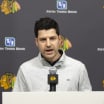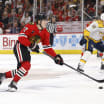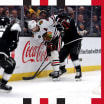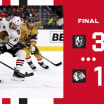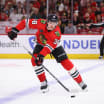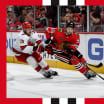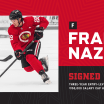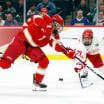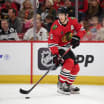Every game is a must-win. It seems like the playoffs, but it's still only March. Points are precious, scoreboards are watched, standings are checked. Math hysteria prevails.
This is the situation for these Blackhawks, who have resurrected what once felt like a lost season into a genuine bid for the postseason. Perspiration works, as they exhibited Sunday night with a gritty overtime 2-1 conquest over the Colorado Avalanche. It is a different feeling for a franchise that has won three Stanley Cups this decade, but it is not unique.
Some 50 years ago, the Blackhawks turned their frigid winter into a starring role in what would evolve as the tightest race ever in the National Hockey League. They went from the bottom to the top, an unprecedented feat, yet did not finish in first place until the last night on the regular schedule.
THE VERDICT: Blackhawks no stranger to crazy finishes
In the midst of this year's playoff race, Team Historian Bob Verdi takes a look back at one of the tightest races in NHL history
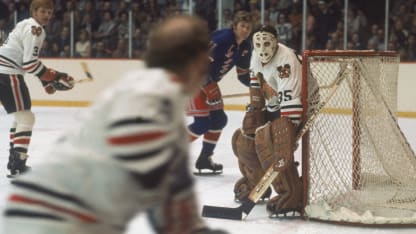
The 1969-70 Blackhawks reported to work in ill-humor. They had brought up the rear of the East Division the previous year; Pit Martin in a summer salvo blasted the team for lacking spirit; their productive right winger, Kenny Wharram, suffered a career-ending heart attack during training camp; and Bobby Hull was absent, holding out because of a contract dispute.
When the Blackhawks lost five straight games to start the regular season, roiled fans booed the product and called for Head Coach Billy Reay's job. It was ugly. The roster and the system were in a state of transition, but patience was a tough sell.
Then, Tony Esposito, a rookie goalie acquired for a scant $25,000, authored a 5-0 gem against his former team, the Montreal Canadiens, at the Forum. Keith Magnuson, a defenseman who oozed passion, became a glue guy. His Denver University teammate, Cliff Koroll, played 200 feet at right wing. Three kids out of college, a rarity then, infused the Blackhawks with new blood, and a better mood.
Hull returned in mid-November, and Stan Mikita was on fire. Still, by early January, the Blackhawks were at breakeven: 15-15-5, hardly a playoff gait. Then they embarked on an incredible tear, losing only seven of their last 41 games. It was remarkable, but it also was required. With third-year expansion teams in the West, all Original Six members were stacked in the East, and only the Toronto Maple Leafs did not partake of a communal stretch so ferocious that Esposito remarked, "We had to win every night just to keep pace."
On April 5, at Sunday's end to the season, the Blackhawks were tied for first with the Boston Bruins at 97 points. The Detroit Red Wings had secured third place with 95. Montreal had 92 after losing to the Blackhawks at home the previous night, and the New York Rangers, who had led the division for most of the winter, had fallen to 90. They had to beat Detroit at home and then, if that happened, hope for help from the Blackhawks, who had Montreal in the Stadium for their back-to-back.
The Rangers also needed to exceed the Canadiens in total goals for, which was then the second tiebreaker after victories. With Montreal players watching the CBS game of the week in their Chicago hotel, the Rangers whipped Detroit, 9-5, that afternoon. Desperate for more scoring, New York pulled goalie Ed Giacomin for a sixth attacker while leading 9-3. New York pounded 65 shots at Detroit's backup goalie, Roger Crozier, to settle for 92 points and 246 total goals, four more than Montreal.
The Canadiens were furious about the Red Wings' perceived lack of effort and minimal shifts by icons such as Gordie Howe, but Detroit coach Sid Abel cited his team's grueling schedule of four games in five days that included a round-trip bus trip to Chicago earlier in the week. Yes, a bus trip. Montreal's fury escalated when Garry Unger of the Red Wings was interviewed between periods at Madison Square Garden. Asked why his squad appeared so sluggish, he explained that, well, a few of his mates partied too hard after their playoff-clincher the previous night.
The Bruins beat visiting Toronto that Sunday evening to finish with 99 points. An hour after that puck drop, the drama at the Stadium commenced with an amazing plot: a triumph by the Blackhawks would also mean 99 points, and first place because of more wins than Boston, 45 to 40. Meanwhile, the Canadiens had either to win, tie or score five goals to clinch the fourth and final playoff berth over New York, which also had 38 victories.
Talk about the old days. That crucial finale in the Stadium was not televised in either market, Chicago or Montreal. The Rangers, straining in New York to find the game on WGN radio, had to wait until the Blackhawks' broadcast went on the air - second and third periods only, as per usual.
The Blackhawks, who beat the Canadiens 4-1 the previous evening, picked up where they left off at the Forum. Hull made it 3-1 early in the second period. Martin then tallied twice in the third period to complete his hat trick and the Blackhawks led, 5-2. By now, the standing room only Stadium crowd was roaring. Meanwhile, the Canadiens were in a spot you wouldn't wish on a leopard. They trailed the Blackhawks by three goals and required three goals to pass the Rangers.
Thus, Montreal coach Claude Ruel forsook an attempt to win the game. Midway in the third period, whenever the Canadiens seized control of the puck, goalie Rogie Vachon vacated his cage for a sixth skater. In a bizarre conclusion to a weekend fraught with drama, the Blackhawks scored five empty-net goals before a delirious audience. Eric Nesterenko, Bobby then Dennis Hull, Koroll and Gerry Pinder feasted. The final was 10-2. The Blackhawks won the East, only their second first place finish in history, after finding themselves - even as their hot streak took hold - 13 points from the top in late January, and in fifth place.
Largely because of Esposito, the Blackhawks shaved 76 goals against from the previous season - exactly one per game. He earned the Calder Trophy as best rookie, one season after having his name engraved on the Stanley Cup as a member of the Canadiens. In 63 appearances, workhorse "Tony O" authored 15 shutouts - a mark that still stands and might last a while. Magnuson, when not accumulating 213 penalty minutes, wound up with a spiffy plus-38.
While Canada rued the unimaginable - no representative in the Stanley Cup Playoffs, another first - the Blackhawks celebrated accordingly. Reay, the wily bench boss whom fans wanted to escort out of the building in October, was carried off the ice by his players.
During the offseason, the NHL changed the order of tiebreakers: the second, behind victories, would now be goal differential. Also that summer, when the next season's schedule was unveiled, the Canadiens circled the date for their first game against the Red Wings.




